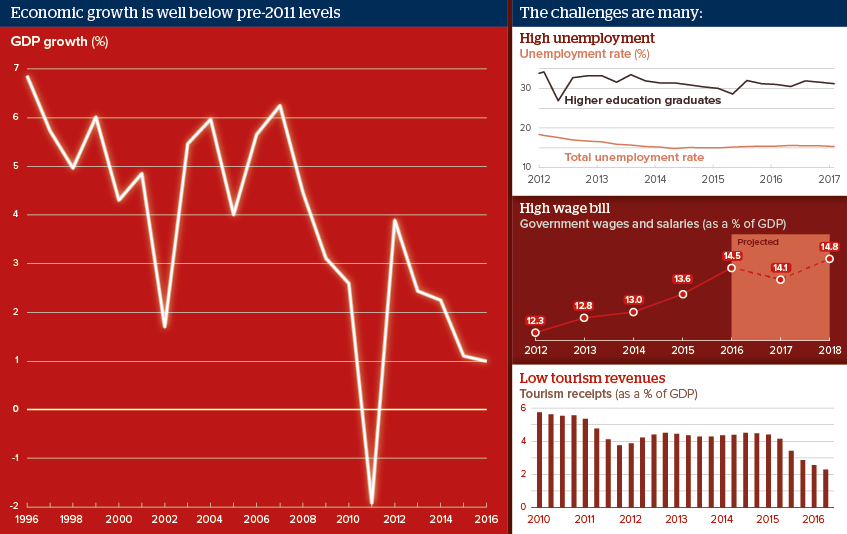Economic woes threaten Tunisia’s ‘Arab Spring’ success
Tunis is struggling to deal with a stagnating economy and unrelenting civil unrest
Source: IMF Country Report No. 17/203, Tunisian National Statistics Institute
Outlook
Billed as the success story of the ‘Arab Spring’, Tunisia has quietly fought an uphill battle to complete its transition. Terrorist attacks in 2015 scared away recovering tourism and investment: they pushed tourist arrivals down to 4.2 million from 6.1 million in 2014; foreign direct investment reached a new low of 2% of GDP in 2016. Efforts to reform the economy have faltered as the government has met strong union opposition.
Strikes and demonstrations have proliferated. Many of those are against high unemployment, which stood at 15% in May 2017 for the general population -- and double that for university graduates. Seeking to placate protesters, Tunis boosted the public-sector wage bill to an estimated 14.5% of GDP in 2016 from 12.3% in 2012. Reducing it is unlikely to be a priority for the government despite IMF pressure: it would be politically costly to cut government jobs or salaries at a time of high unemployment.
Impacts
- Industrial action has forced stoppages in the oil sector and will scare away further investment.
- Improved security will bring some gains to the tourism sector, but instability in Libya and Egypt will cap arrivals.
- The interior regions will see limited improvements from tourism; smuggling is likely to remain a key source of income.
- The premier’s anti-corruption drive is popular, but may falter if investigators turn to senior politicians.
See also
- Tunisia's presidential candidates will need allies - Sep 18, 2019
- Tunisia pre-poll tactics reveal democratic flaws - Jun 25, 2019
- Tunisian transition is far from over - Feb 2, 2018
- Tunisia faces recurring austerity protests - Jan 15, 2018
- Tunisian municipal elections will change power balance - Oct 27, 2017
- Public sector wages will test Tunisia-IMF relations - Oct 18, 2017
- Reshuffle bolsters Tunisia's president - Sep 14, 2017
- Persistent protests threaten Tunisian government - May 10, 2017
- More graphic analysis
